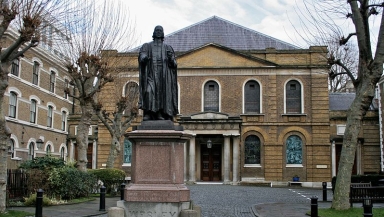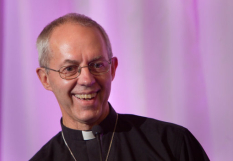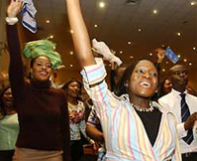
Cormac McCarthy's novel 'The Road', set in the near future after an undefined apocalypse, envisages a comfortless wasteland in which a few wretched survivors struggle for a few more years of existence.
I thought of 'The Road' when I read the latest membership figures from the Methodist Church. A 'Statistics for Mission' report to the Methodist Conference later this month, reported in this week's Methodist Recorder, makes grim reading. During the last 10 years both membership and attendance have fallen by a third; membership from 304,971 in 2003 to only 208,738 in 2013, while attendance has fallen from 326,400 in October 2003 to only 224,500 in October 2013. Numbers on community rolls, which include the church "fringe", have fallen even further, by 48 per cent; the number of children has fallen by 58 per cent.
If any worse news were needed, it is provided by the age breakdown of those who are left. Eighteen per cent are over 81 and 51 per cent are between 66 and 80. In the nature of things, the next 10 years is likely to see even more dramatic falls.
Generally speaking, when figures like this come out there are valiant attempts to see silver linings in the thunderclouds. "Look, it's not as bad as all that: adjusted for this variable and that expectation, all in all and in the round we're doing pretty well." Let's keep the show on the road and, whatever you do, don't frighten the horses.
It is to the credit of the Church that its general secretary, Rev Dr Martyn Atkins, is making no attempt to do this. In his report to the Conference, he says: "However the Statistics for Mission report is understood and interpreted it does not make for easy or comfortable reading. If ever we needed any encouragement to continue to focus on those things that make for an ever better Church which is a discipleship movement shaped for mission today, then these statistics provide that."
These figures will be a body blow to Methodists. However, they will pick themselves up from the canvas after a count of eight or nine, go back to their corner and after a wet sponge and a good talking-to, come out fighting.
But how?
There are no quick fixes; and in any case, any non-Methodist ought to be very slow to offer advice. Here, though, are some ideas that might be worth thinking about.
- Be realistic. It is what it is; don't try and massage the figures to make them say what they don't. Fewer people means fewer resources, which means less capacity to serve, to transform and to witness.
- Be brave. It will get worse before it gets better. There are a lot of aged saints who are going to be promoted to glory and not many younger ones coming up to replace them. Plan to cope with more decline.
- Be honest. That's not quite the same as being realistic. Don't use rhetoric about being faithful rather than successful to gloss over the situation. Don't talk about the inscrutable purposes of God and how he moves in a mysterious way, and how all over the Connexion seeds of new life are being planted which will bear fruit according to God's perfect timing. Don't talk up the good that is still being done with fewer people. That's not the point.
- Be ruthless... You have 4,800 chapels, and that's too many. Close some, sell the buildings and use the money.
- ...But not too ruthless. Many of these are the only functioning place of worship in the town or village. They might be liabilities at the moment, but they could be assets. Develop a strategy to support and revive them.
- Don't lose your nerve. There is a huge amount about Methodism for non-Methodists to admire. In your political and social awareness, your sense of the breadth and scope of the Gospel and your willingness to put serious money into transforming society, you leave other Nonconformist denominations standing. Be confident in who you are; don't imagine that if you can just ape what other Churches do the problem will go away.
- Don't beat yourselves up too much. Your churches are lovely (mostly) and your ministers are capable.
- Be deeply, painfully self-critical. The hardest thing we can ever do is critique who and what we are, because it means standing outside the frame of reference which we've always taken for granted. But the Methodist Church has the opportunity to ask itself really hard questions about how it expresses the Gospel and embodies the Kingdom in the 21st century, and about whether it has enough of an evangelistic drive to survive - not, as its general secretary also says, for the sake of the survival of the institution, but because "the best thing that anyone can do, whoever they are, wherever they live, at whatever time and in whatever circumstances, is to become a disciple of Jesus Christ. And consequently seeking and finding apt, relevant, sensitive and effective ways of presenting Jesus Christ to the world in which we live with so many and so different others is the critical task of the Church today."Mark Woods is a freelance writer and Baptist minister

















